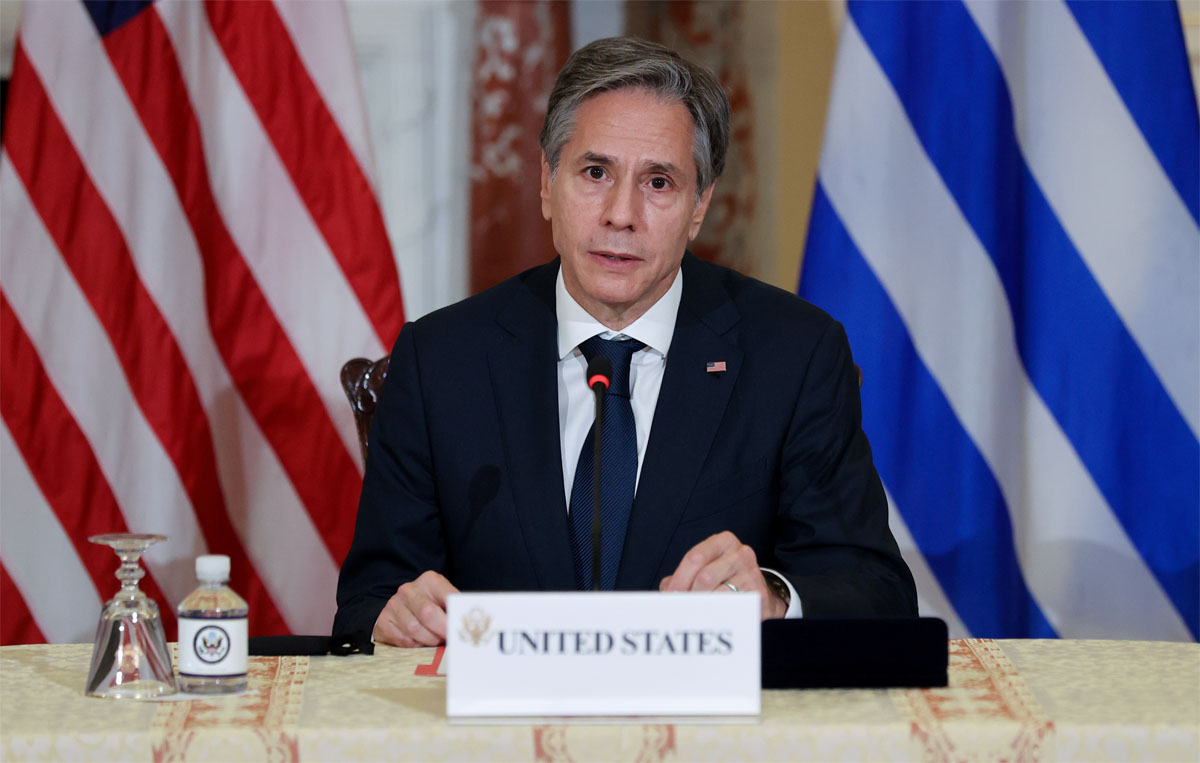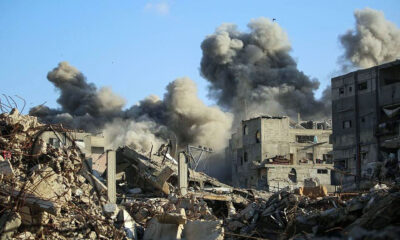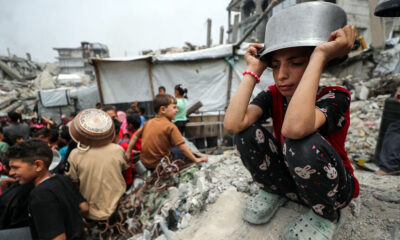International
Gaza: US says ceasefire plan on course, cautions Hamas against proposed changes

Gaza: US says ceasefire plan on course, cautions Hamas against proposed changes
US Secretary of State Antony Blinken has told Hamas that it is “time for the haggling to stop”, after its leaders proposed “numerous changes” to a plan for a Gaza ceasefire and hostage release deal.
He told reporters in Doha that some of the changes were “workable” and others were not, but that the US and mediators Qatar and Egypt would “try to close this deal”.
Hamas said on Tuesday that it was ready to “deal positively” with the process but stressed the need for Israel to agree to a permanent ceasefire and full withdrawal from Gaza.
The Israeli government did not comment, but an anonymous official said the Palestinian armed group’s response amounted to a rejection.
Israel’s prime minister has not yet publicly endorsed the proposal, which US President Joe Biden said had been offered by the country when he outlined it 12 days ago.
But Mr Blinken said Benjamin Netanyahu had “reaffirmed his commitment” during a meeting in Jerusalem on Monday.
The UN Security Council also passed a resolution supporting the proposal that day, adding to the diplomatic pressure that Washington is exerting.
The BBC is part of the travelling press pool on the US secretary of state’s visit to Qatar – a glittering Gulf location that belies the sense of regional crisis he is attempting to solve with a diplomatic tour taking place at breakneck speed.
There was an embrace and smiles Mr Blinken met the Qatari Prime Minister and Foreign Minister Sheikh Mohammed bin Abdul Rahman Al Thani.
READ ALSO:
- Decline reinstatement, follow your grandfather’s footsteps, Nyass family urges Emir Sanusi
- S’African soldier convicted of deliberately infecting girlfriend with HIV
- HoS suspends perm sec, orders probe over alleged sexual harassment
His country is a key player in this crisis, having hosted the political offices of Hamas for more than a decade and been a conduit for negotiations with Israel.
Mr Blinken seemed exasperated as he told a joint news conference that they had been discussing the changes requested by Hamas to the US-backed ceasefire proposal.
“A deal was on the table that was virtually identical to a proposal that Hamas put forward on 6 May – a deal that the entire world is behind, that Israel has accepted, and Hamas could have answered with a single word: ‘yes’,” he said.
“Instead, Hamas waited nearly two weeks and then proposed more changes, a number of which go beyond positions that it had previously taken and accepted. As a result, the war that Hamas started… will go on, more people will suffer, Palestinians will suffer, more Israelis will suffer.”
Mr Blinken did not clarify what changes he said Hamas was demanding, nor did a brief statement issued by the group itself on Tuesday evening.
The statement did, however, reiterate a demand for what Hamas called “a complete halt of the ongoing aggression against Gaza” and the full withdrawal of Israeli forces.
A member of Hamas’s political bureau, Izzat al-Rishq, said the response was “responsible, serious and positive” and that it opened up “a wide pathway” to reach an agreement.
The Israeli prime minister’s office did not release an on-record reply.
But a statement was issued by an anonymous Israeli official, who said that Hamas had “changed all of the main and most meaningful parameters” and “rejected the proposal for a hostage release that was presented by President Biden”.
In a later statement on Wednesday, cited by Reuters news agency, Hamas said it had shown “full positivity” in its efforts to reach an agreement, adding that it had urged Mr Blinken to put “direct pressure” on Israel.
READ ALSO:
- Finland, EU shielding Simon Ekpa – Defence Chief
- APC can no longer win elections except through rigging, says ex-party National VC Salihu Lookman
- Postpone Olympics trial until after Sallah, MURIC tells AFN
Despite the setbacks, Mr Blinken said the US, along with Qatar and Egypt, would “try to close this deal”.
“I believe those gaps are bridgeable. But that doesn’t mean they will be bridged because, ultimately, Hamas has to decide.”
Sheikh Mohammed said both Hamas and Israel needed to make some concessions.
“We are witnessing a shift in this conflict in the recent period and there is a clear and firm call to end this war,” he noted.
Mr Blinken also said it was crucial to develop plans for the “day after the conflict” in Gaza as soon as possible in order to achieve an enduring end to the war.
“In the coming weeks, we will put forward proposals for key elements of a ‘day after plan’, including concrete ideas for how to manage governance, security, reconstruction,” he added.
The Israeli military launched a campaign in Gaza to destroy Hamas in response to an unprecedented attack on southern Israel on 7 October, during which about 1,200 people were killed and 251 others were taken hostage.
More than 37,200 people have been killed in Gaza since then, according to the territory’s Hamas-run health ministry.
A deal agreed in November saw Hamas release 105 of the hostages in return for a week-long ceasefire and some 240 Palestinian prisoners in Israeli jails. Israel says 116 hostages are still being held, 41 of whom are presumed dead.
Mr Biden said the new proposal involved three phases.
The first would involve an initial six-week ceasefire, when Hamas would release some of the hostages – including women, the elderly and the sick or wounded – in exchange for Israel releasing an undefined number of Palestinian prisoners. There would also be a withdrawal of Israeli forces “from all populated areas of Gaza” and a “surge” in humanitarian assistance.
The second phase would see all remaining living hostages released and the withdrawal of all Israeli forces from Gaza as part of a “permanent cessation of hostilities”, but the latter would still be subject to further negotiations.
During the third phase, the remains of any dead hostages would be returned and a major reconstruction plan for Gaza would commence.
While the White House is in effect trying to bounce the sides into progress on an agreement, Israel’s leadership remains deeply sceptical about it.
Far-right ministers are pressuring Mr Netanyahu to ignore Washington’s diplomacy and have threatened to quit his governing coalition and trigger its collapse if the US-backed proposal goes forward, seeing it as a surrender to Hamas.
The prime minister has not unequivocally voiced support for the plan, which he has acknowledged was authorised by his war cabinet.
The actual Israeli proposal – reportedly lengthier than the summary presented by Mr Biden – has not been made public and it is unclear whether it varies from what the president conveyed. It was presented to Hamas days before Mr Biden’s speech.
Gaza: US says ceasefire plan on course, cautions Hamas against proposed changes
BBC
International
UK Court Hands Life Sentence to Nigerian Teen for Knife Attack Killing

UK Court Hands Life Sentence to Nigerian Teen for Knife Attack Killing
A Nigerian teenager residing in the UK, Jackson Uwagboe, has been sentenced to life imprisonment for the murder of 21-year-old Robert Robinson, following a brutal knife attack in Lewisham, London. The sentencing was delivered at the Old Bailey on Wednesday.
The Metropolitan Police confirmed that 19-year-old Uwagboe of Hamilton Street, Lewisham, was found guilty of murder on Tuesday, 10 February 2026, in a case stemming from a dispute over a stolen bicycle. The court ruled that Uwagboe must serve a minimum of 21 years before he can be considered for parole.
Uwagboe’s co-defendant, Eromosele Omoluogbe, 24, was earlier convicted of perverting the course of justice after assisting Uwagboe in attempting to flee to Nigeria via Heathrow Airport.
READ ALSO:
- Ogun Gov Rewards Nigeria’s Best Primary School Teacher with Car, Bungalow
- Police Bust Gang Armoury, Arrest Two Suspects in Delta
- Peter Obi Launches ‘Village Boys Movement’ to Rival Tinubu’s City Boys Ahead of 2027
Prior to this sentencing, two other men, Ryan Wedderburn, 18, and Kirk Harris, had already been convicted and handed life sentences in May 2025 for their roles in the same murder.
Detective Inspector Neil Tovey, who led the investigation, described the incident as a “brutal and sustained attack”. He said, “Robert was subjected to a brutal and sustained attack by a group of men armed with knives. He was unarmed, already wounded, and on the ground when Uwagboe attacked him. Today’s verdict brings justice for Robert Robinson and his family.”
The case has drawn attention to youth violence, knife crime, and gang-related activity in London, as well as the challenges faced by law enforcement in preventing violent disputes over seemingly minor disputes such as bicycle theft.
The sentencing underscores the UK judicial system’s approach to serious violent crimes, ensuring that perpetrators face long-term incarceration while providing a clear minimum term before parole consideration.
UK Court Hands Life Sentence to Nigerian Teen for Knife Attack Killing
International
UK-Based Nigerian Gets 13-Year Jail Term for Forcing Girlfriend to Abort Pregnancy

UK-Based Nigerian Gets 13-Year Jail Term for Forcing Girlfriend to Abort Pregnancy
A UK-based Nigerian man, Adeleke Adelani, has been sentenced to more than 13 years’ imprisonment for unlawfully aborting the pregnancy of his former partner after coercing her to take abortion medication on Valentine’s Day.
The offence occurred in 2020 when Adelani, then 28 years old, deceptively invited the woman — whose identity is legally protected — to his residence in Letterkenny under the guise of discussing the future of her pregnancy. Evidence before the court showed that the victim was nine weeks pregnant at the time of the incident.
Prosecutors told the court that upon her arrival, Adelani threatened the woman with violence and forced her to ingest five tablets of misoprostol, a drug used for medical abortions, thereby causing the unlawful termination of the pregnancy. The court heard that the defendant had researched the medication in advance and acted deliberately. The victim later contacted authorities, leading to Adelani’s arrest by Irish police.
READ ALSO:
- Lawmaker Jailed for Mocking President in Facebook Post
- Police to Arrest TikToker Mirabel After She Recants False Rape Claim
- Tinubu Reduces Reliance on U.S, Strengthens Defence Partnerships With Turkey, EU
At the time of the sentencing, Adelani was already serving a separate seven-year prison sentence for an unrelated offence. He had initially been due to stand trial last year but pleaded guilty before jury selection began, accepting responsibility for the charges brought against him.
During the sentencing hearing at the Letterkenny Circuit Court, the victim delivered a powerful impact statement, explaining that although she had chosen to forgive Adelani, the consequences of his actions would remain with her for life.
“I have forgiven the defendant,” she told the court. “That forgiveness does not mean what he did was acceptable. It means I refuse to let what he did continue to control my heart and my life. When he wrongfully imprisoned me and caused the termination of my nine-week pregnancy, he took far more than my freedom. He took my child. He took my sense of safety. He took a future that I had already begun to plan and love.”
In a letter read aloud in court, Adelani apologised to the victim, accepted full responsibility for his actions, and expressed remorse for the pain and trauma he caused.
Delivering judgment, John Aylmer described the crime as deliberate, premeditated, and deeply traumatic, stressing that it involved coercion, abuse, and a serious violation of trust. The judge sentenced Adelani to 11 years in prison, with the final two years suspended, for causing the unlawful termination of a pregnancy, and an additional five years, with the last 12 months suspended, for assault causing harm.
The sentences are to run concurrently, adding to Adelani’s existing term and resulting in an overall prison sentence exceeding 13 years. The case has reignited debate in Ireland and internationally about reproductive coercion, domestic abuse, and violence against women, with legal observers describing it as one of the most serious cases of its kind in recent years.
UK-Based Nigerian Gets 13-Year Jail Term for Forcing Girlfriend to Abort Pregnancy
International
Epstein, Ex-Israeli PM Named in Alleged Profiteering From Boko Haram Crisis

Epstein, Ex-Israeli PM Named in Alleged Profiteering From Boko Haram Crisis
A new investigative report by Drop Site News has alleged that the late American financier Jeffrey Epstein and former Israeli prime minister Ehud Barak leveraged Nigeria’s long-running Boko Haram insurgency to pursue commercial, security, and strategic interests in the country.
According to the investigation, emails released by the United States Department of Justice in 2018 show Epstein acting as a behind-the-scenes facilitator in discussions involving Jide Zeitlin, then chairman of Nigeria’s Sovereign Investment Authority, and Sultan Ahmed bin Sulayem, former chairman of DP World. The exchanges allegedly focused on attempts to secure control of key shipping terminals in Lagos and Badagry, following unsuccessful negotiations with successive Nigerian administrations dating back to 2005.
The report claims DP World was unwilling to invest in a proposed industrial zone in Nigeria without full or majority control of the adjoining port infrastructure, a demand that reportedly stalled the deal for years. Epstein, who died in a New York jail in 2019 while awaiting trial, is alleged to have helped revive talks by brokering introductions and strategic conversations.
READ ALSO:
- CBN Policies, Foreign Inflows Drive Naira to Two-Year Peak
- Edo Governor Okpebholo Names Mercy Johnson-Okojie Special Adviser
- Many Feared Dead as Suspected Lakurawa Militants Attack Kebbi Communities
Drop Site News further reported that bin Sulayem resigned on February 13 after renewed scrutiny of his past links to Epstein resurfaced publicly, intensifying attention on the historical port negotiations and the role of foreign intermediaries in Nigeria’s maritime sector.
Beyond logistics and port infrastructure, investigators highlighted what they described as near-daily correspondence between Epstein and Barak after the former Israeli leader left public office. Barak, who served as Israel’s defence minister until 2013, allegedly sought to deepen Israeli-Nigerian security cooperation, using Nigeria’s counter-insurgency battle as an entry point for Israeli-linked security, energy, and technology investments.
The report said Barak later relied on security networks in Nigeria to promote Israeli defence and surveillance firms. In 2015, Barak and a partner invested $15 million in FST Biometrics, founded by former Israeli intelligence chief Aharon Ze’evi Farkash. The firm’s Basel biometric system, originally deployed at Israel-Gaza crossings, was subsequently marketed in Nigeria as a counter-terrorism solution.
According to the investigation, the biometric technology was introduced at Babcock University as protection against Boko Haram threats, while also being pitched to African governments for broader identity management and population-control applications.
The report further cited a 2020 World Bank-supported initiative involving Israel’s National Cyber Directorate and Toka Group, a cyber-intelligence company co-founded by Barak. The partnership was presented as contributing to Nigeria’s national cybersecurity framework, but Drop Site News argued it also deepened Israeli corporate access to sensitive security architecture.
In its conclusion, the investigation alleged that a network of security interventions, port negotiations, and technology investments enabled Epstein and Barak to profit from instability associated with the Boko Haram conflict, while simultaneously advancing Israeli commercial and strategic interests in Nigeria. The outlet stressed that these claims are based on document reviews and correspondence, framing them as allegations rather than established legal findings.
Epstein, Ex-Israeli PM Named in Alleged Profiteering From Boko Haram Crisis
-

 International2 days ago
International2 days agoCanada Opens New Express Entry Draw for Nigerian Workers, Others
-

 Politics14 hours ago
Politics14 hours agoPeter Obi Launches ‘Village Boys Movement’ to Rival Tinubu’s City Boys Ahead of 2027
-

 News21 hours ago
News21 hours agoPolice to Arrest TikToker Mirabel After She Recants False Rape Claim
-

 News3 days ago
News3 days agoKorope Drivers Shut Down Lekki–Epe Expressway Over Lagos Ban (Video)
-

 Health3 days ago
Health3 days agoRamadan Health Tips: Six Ways to Stay Hydrated While Fasting
-

 Entertainment3 days ago
Entertainment3 days agoActress Destiny Etiko Breaks Silence on Alleged Nollywood Betrayal
-

 metro2 days ago
metro2 days agoOsun Awards 55.6km Iwo–Osogbo–Ibadan Road Project to Three Contractors
-

 International22 hours ago
International22 hours agoEpstein, Ex-Israeli PM Named in Alleged Profiteering From Boko Haram Crisis















